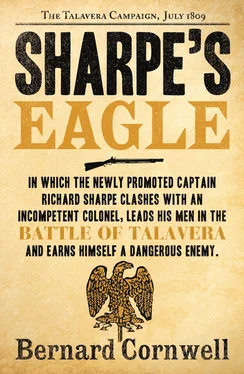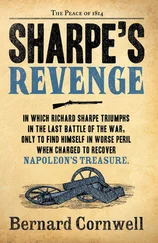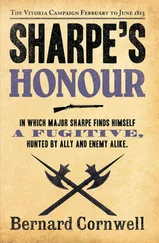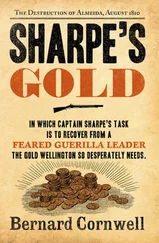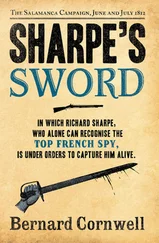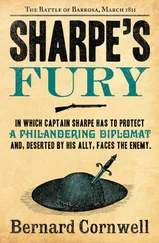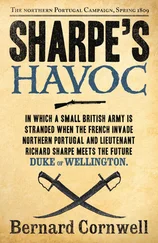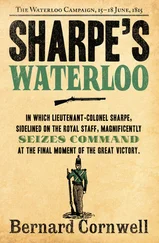‘They’ve taken the wrong turning for Windsor Castle,’ Harper said.
Sharpe shook his head. ‘They’re unbelievable!’ Whoever commanded this Battalion must have made the men’s lives hell to keep them looking so immaculate despite the voyage from England in cramped and foul ships and the long march from Lisbon in the summer heat. Their weapons shone, their equipment was pristine and regular while their faces bulged red from the constricting stocks and the unaccustomed sun. At the head of each company rode the officers, all, Sharpe noted, mounted superbly. The colours were cased in polished leather and guarded by Sergeants whose halberd blades had been burnished to a brilliant, glittering sheen. The men marched in perfect step, looking neither right nor left, for all the world, as Harper had said, as if they were marching for the Royal duty at Windsor.
‘Who are they?’ Sharpe was trying to think of the Regiments who had yellow facings on their uniforms but this looked like none of the Regiments he knew.
‘The South Essex,’ Hogan said.
‘The who?’
‘The South Essex. They’re new, very new. Just raised by Lieutenant Colonel Sir Henry Simmerson, a cousin of General Sir Banestre Tarleton.’
Sharpe whistled softly. Tarleton had fought in the American war and now sat in Parliament as Wellesley’s bitterest military opponent. Sharpe had heard said that Tarleton wanted the command of the army in Portugal for himself and bitterly resented the younger man’s preferment. Tarleton was a man of influence, a dangerous enemy for Wellesley, and Sharpe knew enough about the politics of high command to realise that the presence of Tarleton’s cousin in the army would not be welcomed by Wellesley.
‘Is that him?’ He pointed to a portly man riding a grey horse in the centre of the Battalion.
Hogan nodded. ‘That is Sir Henry Simmerson, whom God preserve or preferably not.’
Lieutenant Colonel Sir Henry Simmerson had a red face lined with purple veins and pendulous with jowls. His eyes, at the distance Sharpe was seeing them, seemed small and red, and on either side of the suspicious, questing face there sprung prominent ears that looked like the protruding trunnions either side of a cannon barrel. He looked, Sharpe thought, like a pig on horseback. ‘I’ve not heard of the man.’
‘That’s not surprising. He’s done nothing.’ Hogan was scornful. ‘Landed money, in Parliament for Paglesham, justice of the peace and, God help us, a Militia Colonel.’ Hogan seemed surprised by his own lack of charity. ‘He means well. He won’t be content till those lads are the best damned Battalion in the army but I think the man has a terrible shock coming when he finds the difference between us and the Militia.’
Like other Regular officers Hogan had little time for the Militia, Britain’s second army. It was used exclusively within Britain itself, never had to fight, never went hungry, never slept in an open field beneath a cloudburst, yet it paraded with a glorious pomp and self-importance. Hogan laughed. ‘Mustn’t complain. We’re lucky to have Sir Henry.’
‘Lucky?’ Sharpe looked at the greying Engineer.
‘Oh, yes. Sir Henry only arrived in Abrantes yesterday but he tells us he’s a great expert on war. The man’s not yet seen a Frenchman but he’s lectured the General on how to beat them!’ Hogan laughed and shook his head. ‘Maybe he’ll learn. One battle could take the starch out of him.’
Sharpe looked at the companies marching steadily through the square like automatons. The brass badges on their shakoes reflected the sun but the faces beneath the brilliance were expressionless. Sharpe loved the army, it was his home, the refuge that an orphan had needed sixteen years before, but he liked it most of all because it gave him, in a clumsy way, the opportunity to prove again and again that he was valued. He could chafe against the rich and the privileged but he acknowledged that the army had taken him from the gutter and put an officer’s sash round his waist and Sharpe could think of no other job that would offer a low-born bastard on the run from the law the chance of rank and responsibility. But Sharpe had also been lucky. In sixteen years he had rarely stopped fighting and it had been his fortune that the battles in Flanders, India and Portugal had called for men like himself who reacted to danger the way a gambler reacted to a deck of cards. Sharpe suspected he would hate the peacetime army, with its church parades and pointless drills, its petty jealousies and endless polish, and in the South Essex he saw the peacetime army he did not want. ‘I suppose he’s a flogger?’
Hogan grimaced. ‘Floggings, punishment parades, extra drills. You name it and Sir Henry uses it. He will have, he says, only the best. And they are. What do you think of them?’
Sharpe laughed grimly. ‘God keep me from the South Essex. That’s not too much to ask, is it?’
Hogan smiled. ‘I’m afraid it is.’
Sharpe looked at him, a sinking feeling in his stomach. Hogan shrugged. ‘I told you there was more. If a Spanish Regiment marches to Valdelacasa then Sir Arthur feels, for the sake of diplomacy, that a British one should go as well. Show the flag; that kind of thing.’ He glanced at the polished ranks and back to Sharpe. ‘Sir Henry Simmerson and his fine men are going with us.’
Sharpe groaned. ‘You mean we have to take orders from him?’
Hogan pursed his lips. ‘Not exactly. Strictly speaking you will take your orders from me.’ He had spoken primly, like a lawyer, and Sharpe glanced at him curiously. There could be only one reason why Wellesley had subordinated Sharpe and his Riflemen to Hogan, instead of to Simmerson, and that was because the General did not trust Sir Henry. Sharpe still wondered why he was needed; after all Hogan could expect the protection of two whole Battalions, at least fifteen hundred men. ‘Does the General expect there to be a fight?’
Hogan shrugged. ‘He doesn’t know. The Spanish say that the French have a whole Regiment of cavalry on the south bank, with horse artillery, who’ve been chasing Guerilleros up and down the river since spring. Who knows? He thinks they may try to stop us blowing the bridge.’
‘I still don’t understand why you need us.’
Hogan smiled. ‘Perhaps I don’t. But there won’t be any action for a month; the French will let us go deep into Spain before they fight, so Valdelacasa will at least be the chance of a scramble. And I want someone with me I can trust. Perhaps I just want you along as a favour?’
Sharpe smiled. Some favour, wet-nursing a Militia Colonel who thought he knew it all, but he hid his feelings. ‘For you, sir, it will be a pleasure.’
Hogan smiled back. ‘Who knows? It might be. She’s going along.’ Sharpe followed Hogan’s gaze out of the window and saw the black-dressed girl raise a hand to an officer of the South Essex. Sharpe had an impression of a blond man, immaculately uniformed, mounted on a horse that had probably cost more than the rider’s commission. The girl spurred her mare forward and, followed by the servant and his mule, joined the rear of the Battalion that was marching down the road that led to Castelo Branco. The square became empty again, the dust settling in the fierce heat, and Sharpe leaned back and began to laugh.
‘What’s so funny?’ Hogan asked.
Sharpe pointed with his cup of brandy at Harper’s tattered jacket and gaping trousers. ‘Sir Henry’s not exactly going to be fond of his new allies.’
The Sergeant’s face stayed gloomy. ‘God save Ireland.’
Hogan raised his cup. ‘Amen to that.’
The drumbeats were distant and muffled, sometimes blending with the other sounds of the city, but insistent and sinister and Sharpe was glad when the sound stopped. He was also glad they had reached Castelo Branco, twenty-four hours after the South Essex, after a tiresome journey that had consisted of forcing Hogan’s mules along a road cut with deep, jagged ruts showing where the field artillery had gone before them. Now the mules, laden with powder kegs, oilskin packets of match-fuse, picks, crowbars, spades, all the equipment Hogan needed for Valdelacasa, followed patiently behind the Riflemen and Hogan’s artificers as they pushed their way through the crowded streets towards the main square. As they spilled into the bright sunlight Sharpe’s suspicions about the drumbeats were confirmed.
Читать дальше
